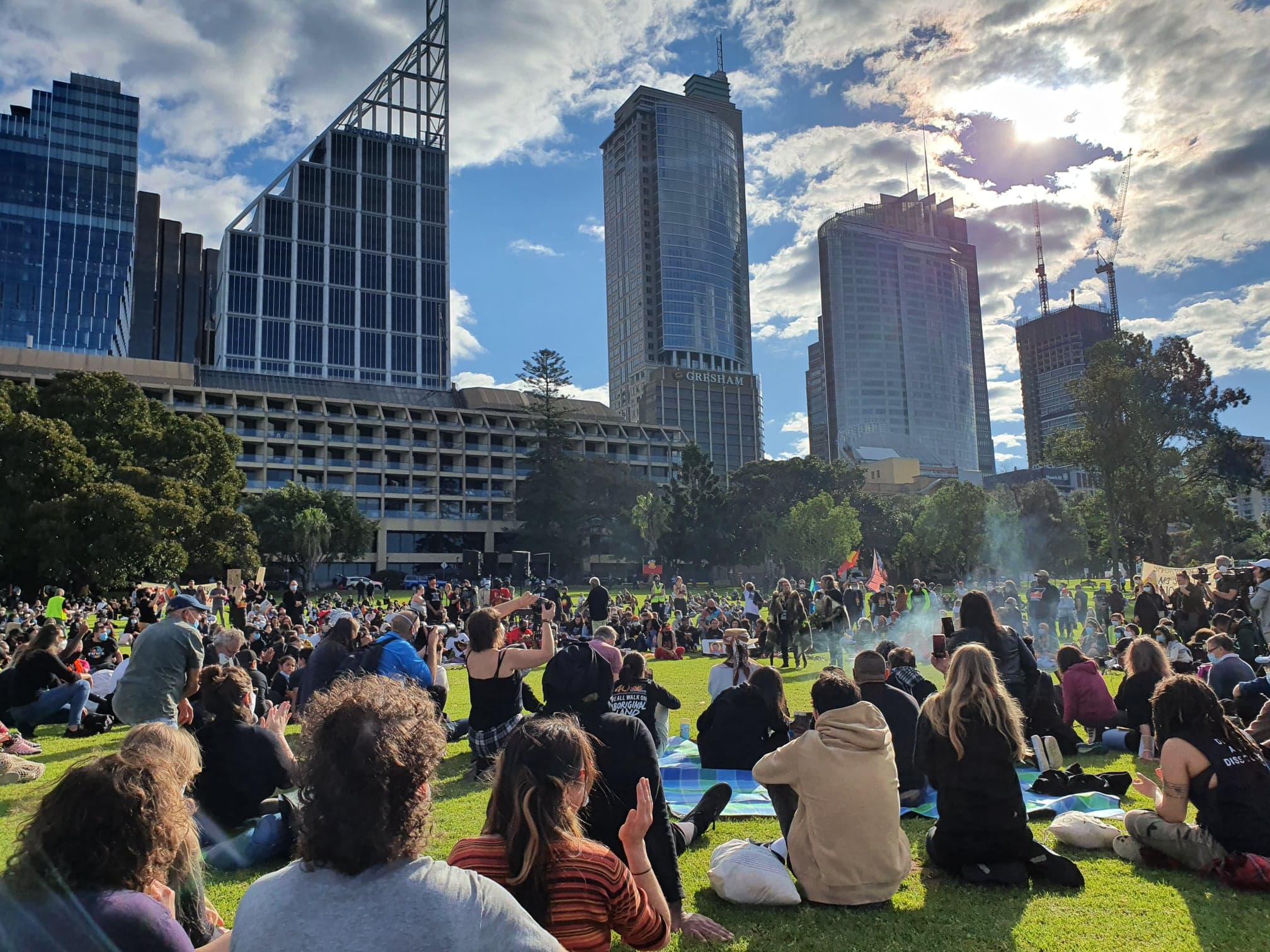Thousands gathered today in the Sydney Domain to support Aboriginal peoples who have lost family members in police custody.
Hosted by ISJA, ASEN NSW, Justice for David Dungay Jnr and the Maritime Union of Australia’s Sydney branch.
A smoking ceremony marked the beginning of the rally, where family members of any First Nations peoples lost to police brutality were invited into the circle for healing.
Aunty Rhonda welcomed attendees to Country, bringing attention to the fact that this rally is taking place on Djarrbarrgalli, Gadigal for the Sydney Domain.
Lizzie Jarrett and Gavin Stanbrook chaired the rally, leading chants “justice today, for David Dungay” and “say their names”.
“They want us to stop protesting because protests work,” Stanbrook said. “Protests bring justice.”
He made reference to the police standing in Hyde Park surrounding the Captain Cook statue in Hyde Park today. “When one statue is threatened, three rows of riot cops stand protecting it.”
Leetona Dungay, mother of David Dungay Jnr, who was killed at Long Bay Prison in 2015, thanked the Gadigal people for having her on their land. She spoke of the hundreds of cold cases of Indigenous death in police brutality, and the fact that police officers have never been held accountable for these deaths.
Leetona Dungay made reference to the fight that Indigenous peoples have been leading for decades. “Sadly Australia, you weren’t with us in these numbers back then. But now it’s happening, and it’s going to keep happening.”
“You killed our black people, we are marching,” she said.
Paul Silva, nephew for David Dungay Jnr, spoke of his family having to watch the video footage of him being murdered. He called for systematic change in the justice system.
“We can’t even walk on our own land and demand change.”
“I’m going to keep fighting until they put me in the ground.”
The families of Tane Chatfield, Nathan Reynolds, Edward Russell and Eddie Murray were just some of the First Nations speakers today, who bravely took to the microphone to share the stories of police brutality that their own families have experienced throughout the decade.
Tane Chatfield died in Tamworth Correctional Centre at 22 years old. His mother and father spoke to the crowd, his father saying, “we want justice for our boy, and for all cold cases of Black deaths in custody”.
Tane Chatfield’s mother asked, “How many more lives does Australia want? It’s time now to rise as a nation. People of all different nations join with us.”
Police waited around the edges of the protest with batons, in attempts to stop a march from occurring.
Nathan Reynolds died of an asthma attack at John Morony Correctional Centre, but it was 40 minutes until any kind of help arrived.
The Reynolds family thanked Aunty Leetona and the Dungay family for giving them the strength to come out and fight for justice for their own brother.
On the 11th December 1993 Edward Russell was severely beaten by 11 police officers while being arrested near Bathurst NSW. On the 4th of December, 1999, Edward lost his life in Long Bay Prison. His parents, Ted and Helen Russell came to the rally from their community in Walgett, Helen telling her story at a rally for what is the first time in the 30 years since the death of her son.
Paul McAleer from the Maritime Union of Australia’s Sydney branch was one of the final speakers, and he stated the Maritime Union’s support for Aboriginal people over hundreds of years.
At the conclusion of the ceremony, attendees began filtering out of the Domain. Police funnelled people towards Town Hall station but marchers continued down Broadway. A crowd of roughly 100 were kettled into Victoria Park. Police tackled a protestor dangerously close to oncoming traffic on a footpath beside Victoria Park and slapped one woman, leading to a tense face off. The police then threatened the remaining protestors with a Long Range Acoustic Device (LRAD).
A group of elders, associated with FISTT, Fighting in Solidarity Towards Treaties, approached the remaining protestors and welcomed them around a campfire, where Aunty Gwenda Stanley educated the crowd on the plights faced by her mob with an impromptu speech. This peaceful gathering, coincidentally also in Victoria Park as part of Black History Week, was a temporary Aboriginal Tent Embassy, reclaiming the same site occupied by First Nations communities during the Sydney Olympics in 2000. One police vehicle approached the campfire before departing, enabling the remaining crowd to leave calmly.
The rally was part of a national weekend of action, which included protests in Perth, Adelaide, Kempsey, Brisbane, Cairns and Darwin.





